Inclusion, Diversity, Belonging, And Equity in CBE
The CBE Department aims to advance Justice, Equity, Diversity, and Inclusion (JEDI) in our community through the activities of a JEDI committee comprising faculty, students and staff.
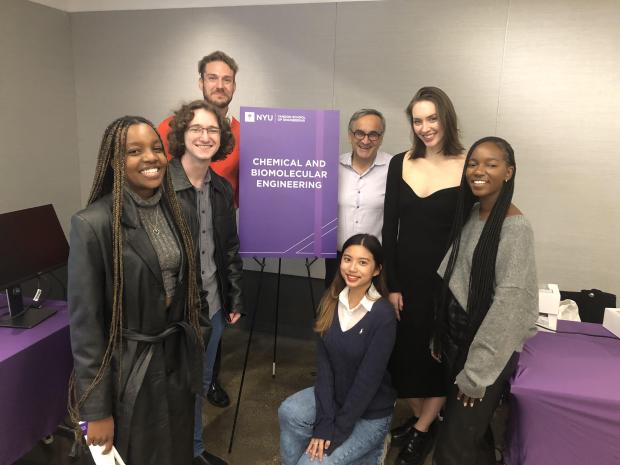
Our Initiatives
Recruitment
Our committee is working closely with the CBE department’s Graduate Admissions team to build equitable recruitment and admissions processes. We strive to have our department reflect that of the U.S. population. View our current demographic data.
In the last year, we have:
- Added graduate students to the Graduate Admissions committee
- Assisted with recruitment via consortiums and professional organizations, including the GEM consortium and NSBE
- Begun hosting a virtual recruitment session open to all
Training
We recognize that building an inclusive environment for our community is ongoing work. This begins with getting everyone, from students to senior faculty, familiar with principles of justice, equity, diversity, and inclusion. We are currently working to develop ongoing, interactive training for our community and through resources available through the Office of Global Inclusion and the Inclusion@Tandon committee.
Programming
We strive to develop programs and resources for students, staff, and faculty committed to educating our community about and combating issues related to injustices and inequities in STEM. Programming and resources will be put together in collaboration with student organizations, including the Graduate Student Council, and existing departments at NYU.
To date, we have:
- Begun hosting listening sessions and conducting surveys on the department climate
- Created an environmental justice reading group open to all members of the CBE community
- Committed to inclusion of 50% seminar speakers who are racial minorities, women and LGBT+ per year, with at least 10% from HBCUs
Department Demographics
The graphs below show demographic data for the department’s student body as collected by NYU. We plan to update the data annually to reflect the department’s changing student body. Since this data is collected by the university, it is not as granular as we would like. For example, only binary gender data is collected and there is no category for Middle Eastern/North African students. Additionally, students who are not US citizens or permanent residents are categorized simply as “International” with no racial or ethnic data recorded, which we believe does not reflect our department, especially since over two-thirds of MS students are international. The racial/ethnic labels used in the graphs below reflect those used by NYU’s survey. The CBE JEDI committee has put together our own demographic survey so that we can collect more detailed data about the department.
The first graph shows that women make up the majority of students in the BS and MS programs, and that their participation is broadly increasing. At the PhD level however, over 70% of students are male.
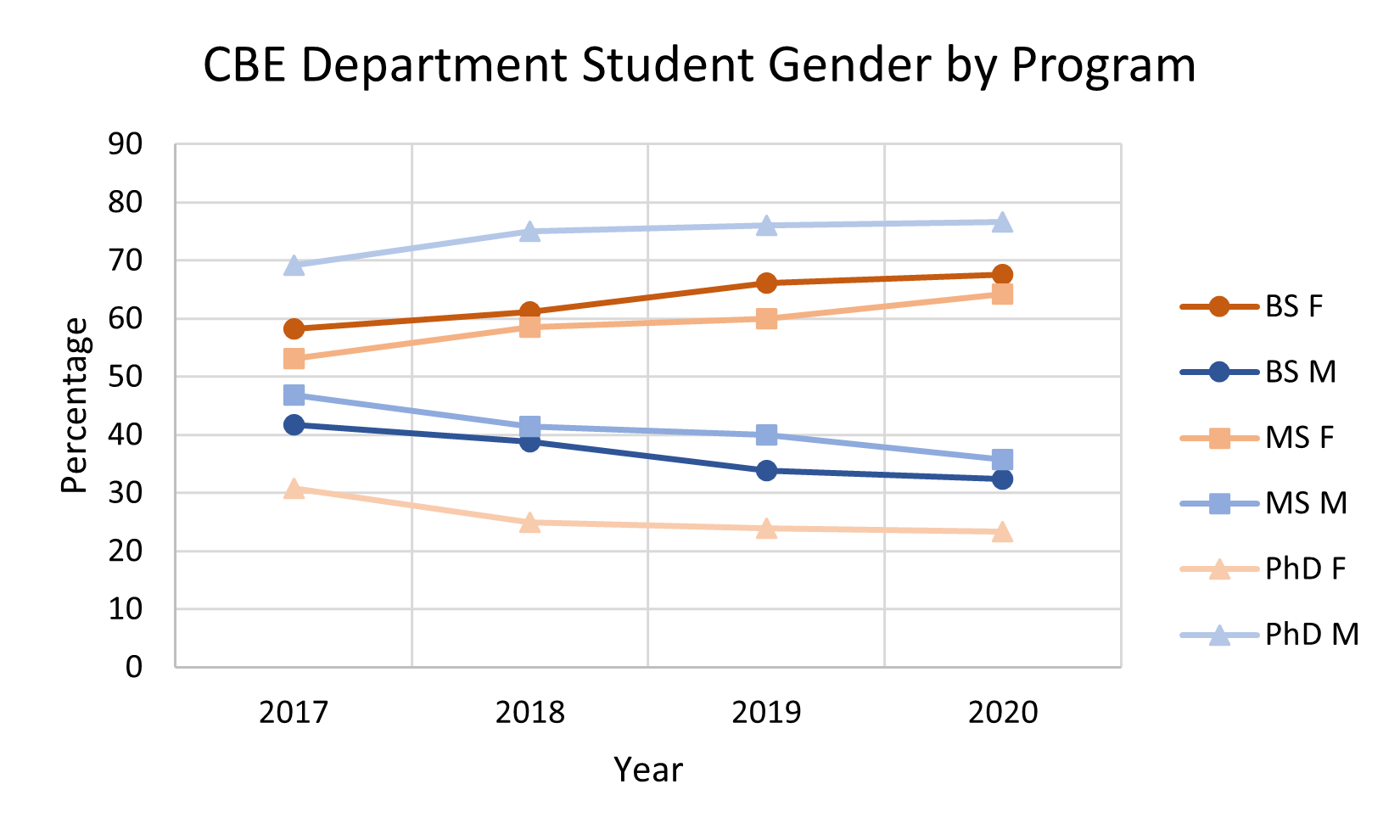
The following graphs show the racial/ethnic breakdown at each degree level. At all levels, white and Asian students are well represented. At the most recent survey of the program, domestic Black and Hispanic students make up 10% and 14% of all students respectively, but representation falls significantly at the graduate level. International students make up the largest category for both MS and PhD students, which somewhat obscures the true makeup of the department at those levels.
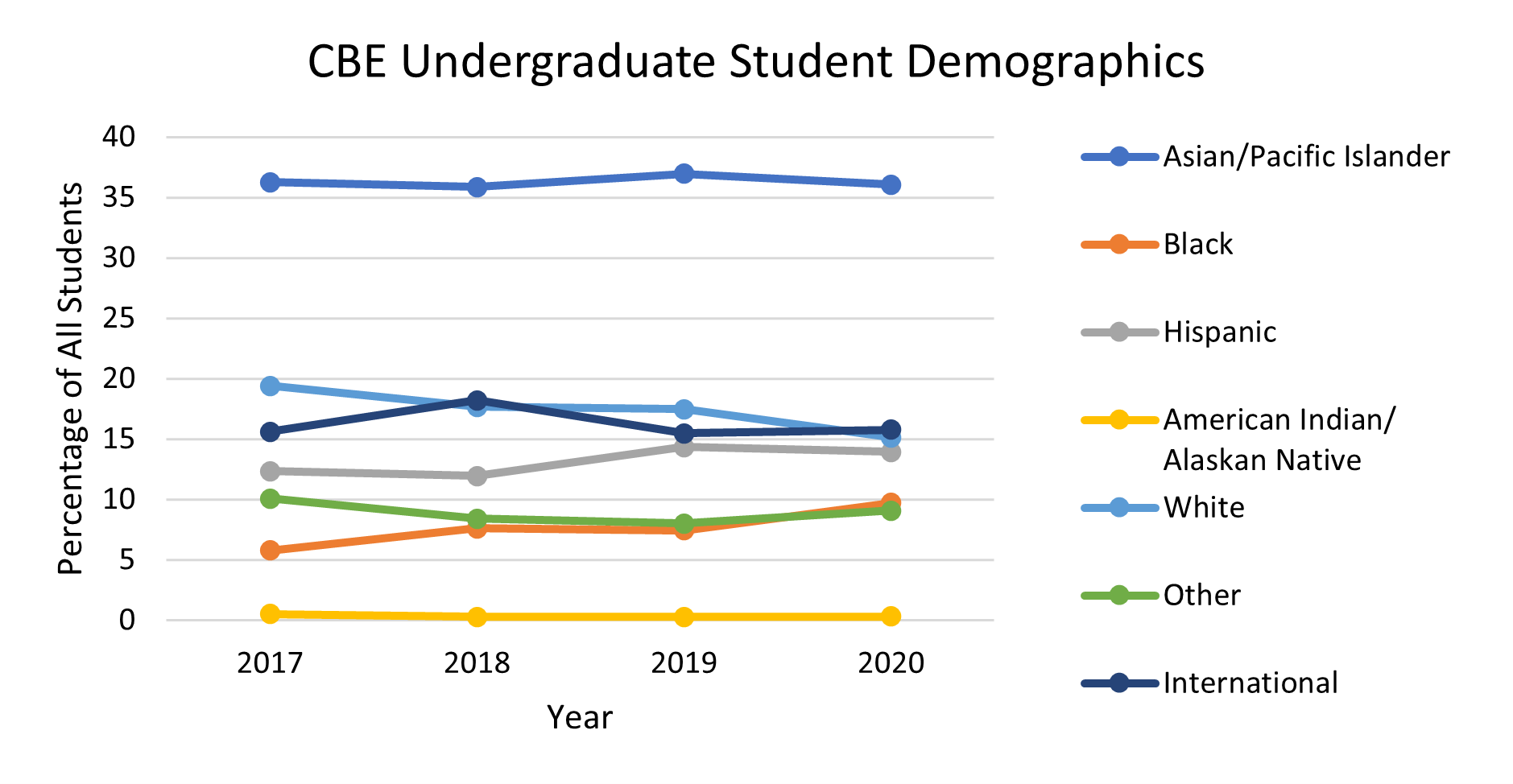
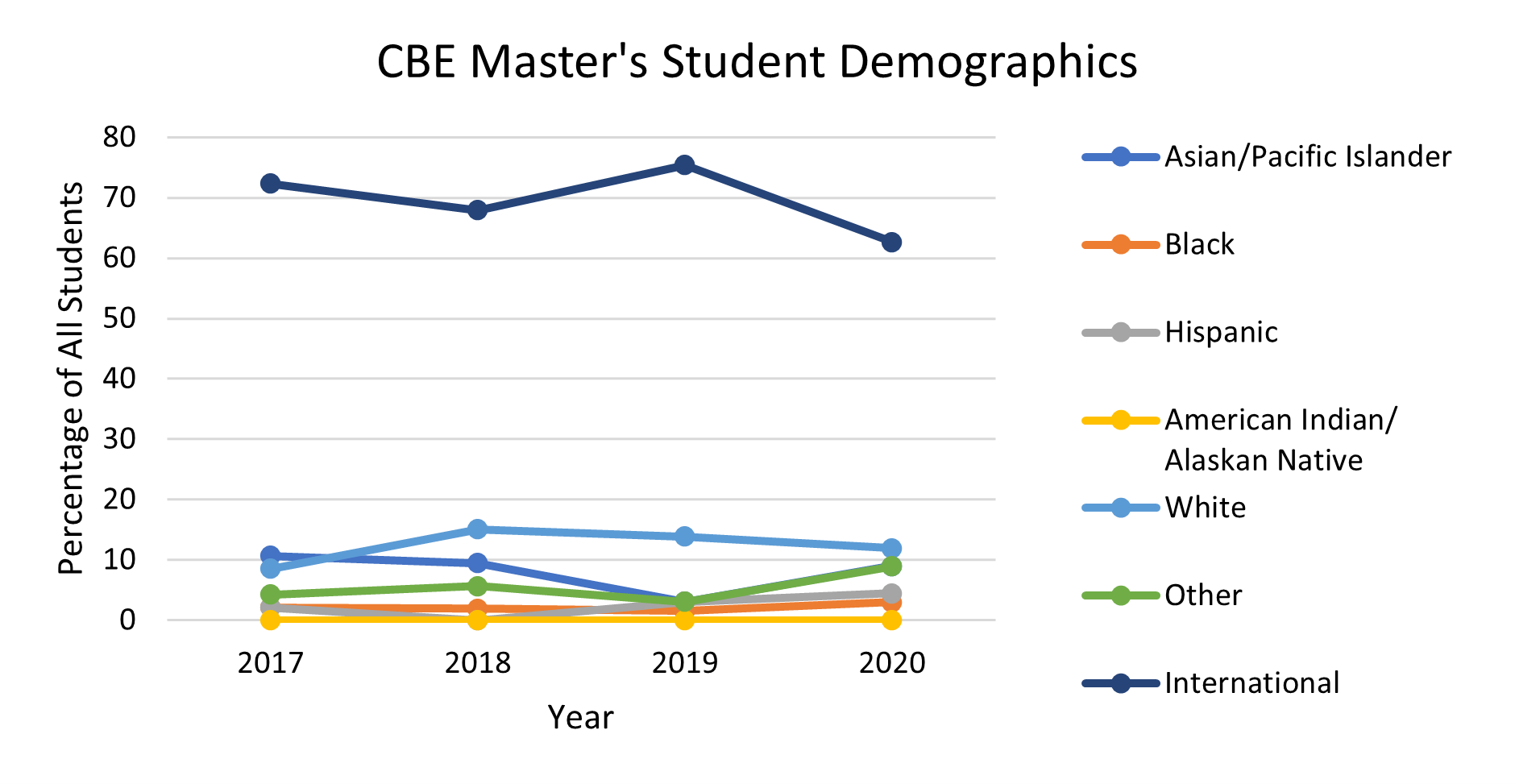
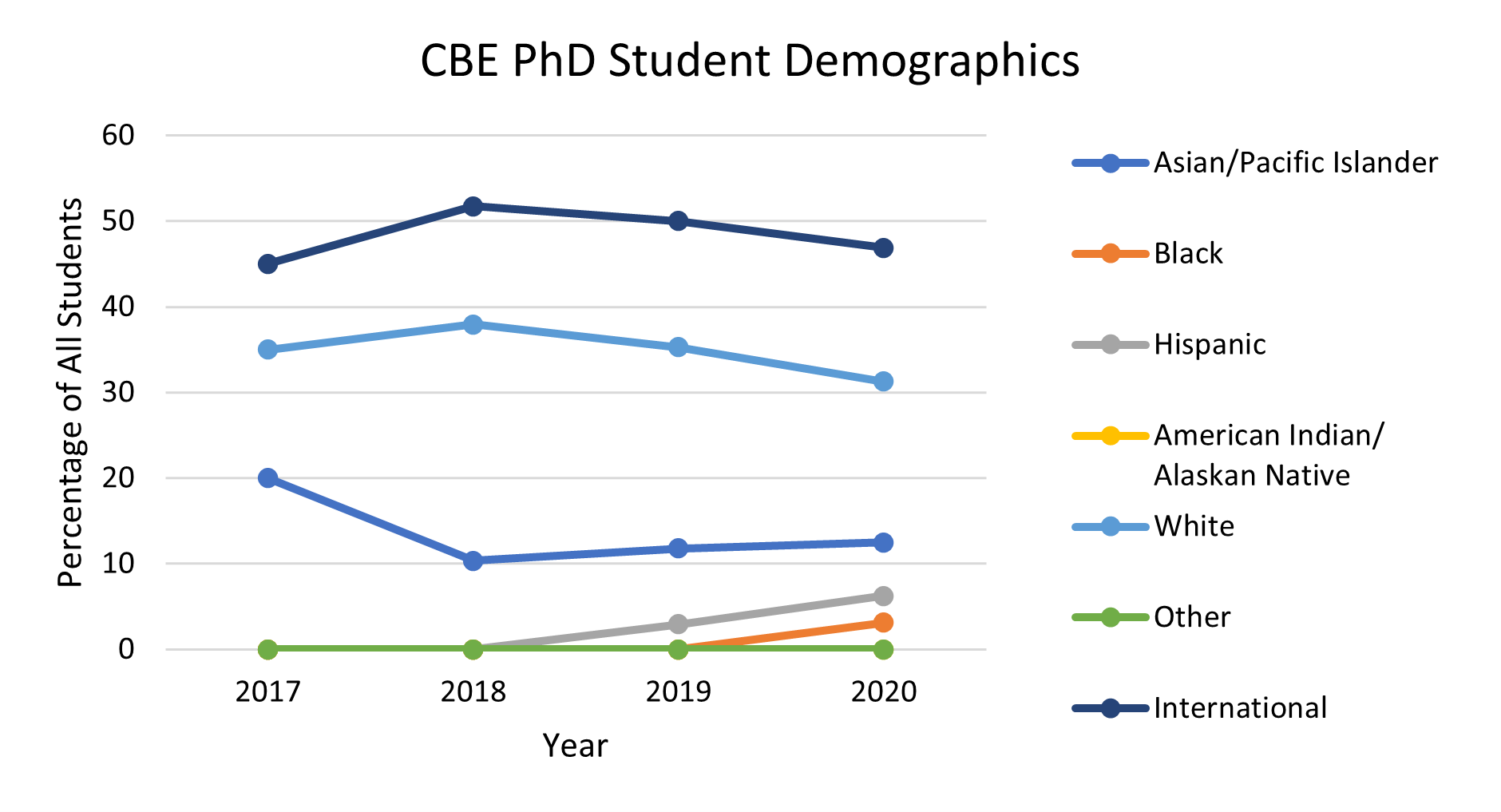
Statement and Plan
Statement on Justice, Equity, Diversity & Inclusion
The Department of Chemical and Biomolecular Engineering strives to create a truly inclusive environment for students, faculty, and staff to thrive during their time at NYU Tandon School of Engineering. We believe that we can only flourish as a department when equitable access to an inclusive environment is ensured. We are committed to justice and equity for all students, especially those who belong to marginalized groups, including women, underserved minority groups, LGBTQ+ students, immigrant students, students with disabilities, and non-traditional students. We believe that to create a truly inclusive environment, we should address systemic issues by giving voice to all individuals in the department, teaching and learning new ways of interacting, and supporting interventions aimed at mitigating financial and personal burdens. We seek to do this by actively
- providing access to institutional resources that protect the physical and mental health of all students
- engaging with our communities to make sure every person’s voice is heard and valued
- increasing representation among underserved groups in STEM at the undergraduate, graduate, post-doctoral, and faculty levels
We commit ourselves to justice, equity, diversity & inclusion because we believe that science should serve society, and that begins with serving the scientific community itself. It begins with making science truly accessible to everyone.
Department of Chemical and Biochemical Engineering Goals
- Improve the diversity of the department at the graduate, post-doctoral, and faculty levels.
- Develop resources and programs for students, staff, and faculty for educating our community about and combating issues related to injustices and inequities in STEM.
- Incorporate inclusive science communication practices into all department programming and educational initiatives.
Strategies
For all efforts, we plan to leverage resources available at NYU available to support our committee, as well as external opportunities such as grants and fellowships to build programs and support our efforts. While the mission of these programs will be guided by the JEDI committee and its members, this effort will require the collaboration of our committee, the department’s admissions and graduate education committees, and offices at Tandon. To streamline this process, we ask that any programming or funding application be presented to the department with at least two weeks ahead of the program/funding deadline. The notice should include an outline of objectives, the program plan, and a list of stakeholders.
1. Improve the diversity of the department at the graduate, post-doctoral, and faculty levels.
This plan has been drafted according to an internal survey of our department demographics. A copy of our survey and the data can be found here. All data was collected anonymously.
We believe that our department makeup should reflect the U.S. population. We have tabulated our current data for undergraduate, graduate, post-doc, and faculty populations below, along with plans to increase diversity within our department.
2. Develop programs and resources for students, staff, and faculty committed to educating our community about and combating issues related to injustices and inequities in STEM. Programming and resources will be put together in collaboration with student organizations, including the Graduate Student Council, and existing departments at NYU.
a. We will create a page on our department website highlighting our commitment to diversity and inclusion, which will include:
- Our statement and plan
- Links to department, institutional, and external resources, including student organizations; fellowships; general information about chemical engineering and graduate school
b. We will put on regular programming to engage our community in conversations and work aligned with our committee’s mission. These programs will bring in experts in diversity & inclusivity practices and social justice issues. We will leverage resources available through the Office of Global Inclusion and Inclusion@Tandon committee to do so.
c. Learning new ways of interacting: For culture change to happen, new skills that support behavior change are key. Training for department chairs and senior faculty/center directors will improve their awareness of issues related to gender/race equity and cultural intersectionality and develop their emotional intelligence and inclusive leadership. In parallel, STEM URM and women faculty will be offered interactive learning workshops and professional coaching sessions on communication, negotiation, self-advocacy, learning to network and find sponsors. Coaching will also focus on work/life balance and mentoring strategies.
d. We will provide students with resources to safely report instances of bias and discrimination witin our department.
3. Incorporate inclusive science communication practices into all department programming and educational initiatives.
We commit ourselves to making sure our programs are accessible to all. Faculty will be taking inclusive teaching practices through Inclusion@Tandon, and we seek to build accessibility into our programming and spaces. This includes:
- Commitment to inclusion of 50% seminar speakers who are racial minorities, women and LGBT+ per year, with at least 10% from HBCUs
- Implementation of accessible practices for in-person and virtual events, leveraging resources available at NYU.

